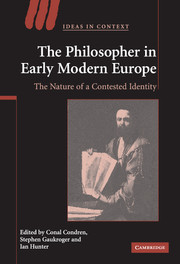Book contents
- Frontmatter
- Contents
- List of contributors
- Acknowledgements
- Introduction
- 1 The persona of the natural philosopher
- 2 The university philosopher in early modern Germany
- 3 The persona of the philosopher and the rhetorics of office in early modern England
- 4 From Sir Thomas More to Robert Burton: the laughing philosopher in the early modern period
- 5 Hobbes, the universities and the history of philosophy
- 6 The judicial persona in historical context: the case of Matthew Hale
- 7 Persona and office: Althusius on the formation of magistrates and councillors
- 8 Descartes as sage: spiritual askesis in Cartesian philosophy
- 9 The natural philosopher and the virtues
- 10 Fictions of a feminine philosophical persona: Christine de Pizan, Margaret Cavendish and philosophia lost
- 11 John Locke and polite philosophy
- Index
- IDEAS IN CONTEXT
3 - The persona of the philosopher and the rhetorics of office in early modern England
Published online by Cambridge University Press: 06 November 2009
- Frontmatter
- Contents
- List of contributors
- Acknowledgements
- Introduction
- 1 The persona of the natural philosopher
- 2 The university philosopher in early modern Germany
- 3 The persona of the philosopher and the rhetorics of office in early modern England
- 4 From Sir Thomas More to Robert Burton: the laughing philosopher in the early modern period
- 5 Hobbes, the universities and the history of philosophy
- 6 The judicial persona in historical context: the case of Matthew Hale
- 7 Persona and office: Althusius on the formation of magistrates and councillors
- 8 Descartes as sage: spiritual askesis in Cartesian philosophy
- 9 The natural philosopher and the virtues
- 10 Fictions of a feminine philosophical persona: Christine de Pizan, Margaret Cavendish and philosophia lost
- 11 John Locke and polite philosophy
- Index
- IDEAS IN CONTEXT
Summary
Through the work of writers such as Marcel Mauss, Ernst Kantorowicz and more recently Erving Goffman, notions of personae and role-play have become familiar as models for understanding society. What is meant by a persona, however, can be variable. At one extreme, it is little more than a performed role and presupposes an inner but ultimately accessible moral and decision-making agent. This inner ‘self’ is thus a postulated explanans for conduct. By the same token, we can hypothesise patterns of tension and socialised pressure when society or a group expects a persona to be adopted, and so compromises the moral integrity of the agent. As Michael Sandel has expressed it in abridging a major focus of communitarian social theory, selves are always socially situated and partially defined by the roles they play. Such triadic models of inner self, role and society have been taken back into the early modern world, for example, by Stephen Greenblatt in his influential Renaissance Self-Fashioning. Greenblatt sought to analyse, inter alia, More's ‘Dialogue of Counsel’ in Utopia, seen as a debate between Hythlodaeus, an unencumbered Self, and Morus, the socially constructed role-player, the point being to illustrate that the Renaissance self had been fully aware of the necessities of role-play and the constraints placed upon its freedom.
At another extreme, however, is the notion of a persona as a manifestation and representative of an office, an embodiment of a moral economy. It is this that Kantorowicz explored with respect to medieval kingship.
- Type
- Chapter
- Information
- The Philosopher in Early Modern EuropeThe Nature of a Contested Identity, pp. 66 - 89Publisher: Cambridge University PressPrint publication year: 2006
- 5
- Cited by

